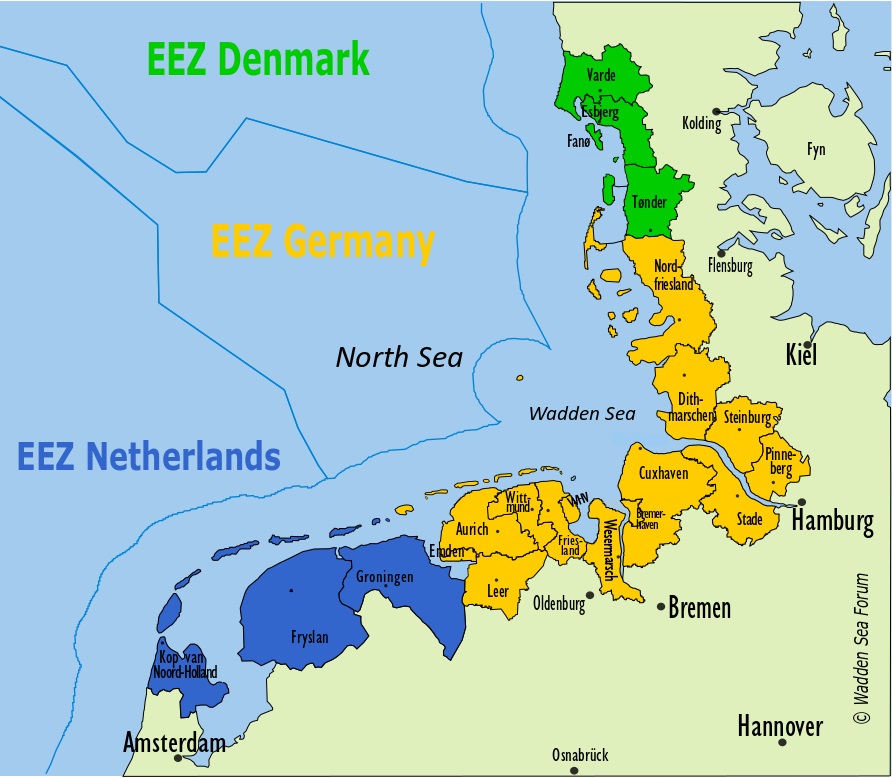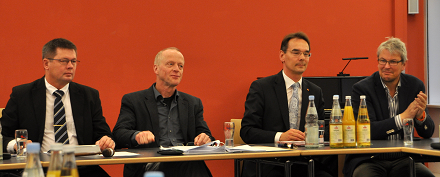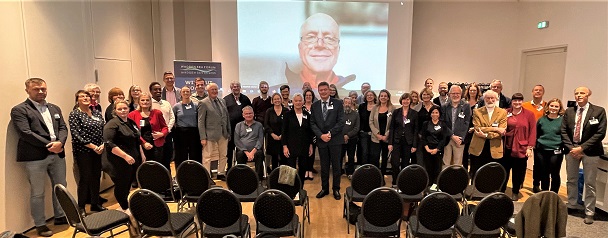About Us
November 13, 2023: the General Assembly 2023-2 decided with eleven out of twelve votes (1 not appeared) to close the WSF e.V. on December 31, 2023. With the beginning of 2024, the WSF has no workable office and the homepage will no longer be maintained. (read more)
The Forum for the Wadden Sea Region (short: Wadden Sea Forum or WSF) was an independent multi-stakeholder, multi-actor platform from Denmark, Germany and the Netherlands and contributed through numerous trilateral activities to a sustainable and future-oriented Wadden Sea Region. In particular, this means integrating specific cross-sectoral and transboundary strategies, actions and techniques which are environmentally sound, economically viable and socially acceptable! These activities were the building bricks of a "Green Coastal Deal" for the Wadden Sea Region.
The WSF was established in 2002, following a decision by the 9th Governmental Conference of the Trilateral Wadden Sea Cooperation. Still in many fields the TWSC and the Wadden Sea Forum were working jointly together.
The WSF consisted of representatives of the sectors Agriculture, Energy, Fisheries, Industry and Harbour, Nature Protection, Tourism, as well as local and regional governments. National governments were represented as observers.

WSF's Vision was
The Wadden Sea Forum contributed to achieving a sustainable society by 2030 and beyond in which:
Economic activity supports social development and safeguards healthy ecosystems and cultural historic landscapes throughout the Wadden Sea Region
The Wadden Sea Forum focused on attaining a sustainable society with healthy ecosystems and economy, respecting the need for effective nature protection and integrating the philosophy of sustainability throughout its dealings.
In order to reach this goal, authorities and other decision making bodies had initiated a development process across the Wadden Sea Region, in which the people and stakeholders were involved. The component sectors had also started a process to maximize their synergies to coordinate regional implementation of conserving natural and cultural assets.
New governance mechanisms, particularly a sound stakeholder-science-policy interface, provided effective information exchange to facilitate the coordinated growth and implementation of trilateral strategies and action plans with regard to spatial planning, infrastructure, transport, agriculture, fisheries, tourism, coastal defense, shipping, port facilities, social services, nature protection and any other policy areas with a possible impact on the sustainable development of the Region.
WSF's Mission was
The Forum for the trilateral Wadden Sea Region was continuously working on
- fostering sustainable development in the Wadden Sea Region through exchange of information on experiences and best practice;
- trying to bring together the distinct sectoral interests of its members;
- exchanging views on general themes and topical issues;
- initiating and implementing projects and actions on topical issues;
- preparing advice on issues related to sustainable development and integrated coastal zone management;
- serving as a consultation body for governments
WSFs anniversaries of fruitful stakeholder involvement und trilateral collaboration (2002 - 2022)

At the WSF 21 plenary meeting on 13-14 November 2012 in Leck, D, the WSF celebrated its 10th anniversary. The Wadden Sea Forum was founded at the 9th Trilateral Governmental Conference for the protection of the Wadden Sea in Esbjerg, DK, in 2001 and had its first plenary meeting on 30 August 2002 in Leeuwarden, NL.
Ingbert Liebing, (2nd from right), former member of the German Federal Parliament and WSF foundation member of 2002, held a speech, highlighting the work and achievements of the Wadden Sea Forum. He struck an arc from the achievements of the Trilateral Cooperation for the protection of the Wadden Sea to the involvement of stakeholders with the implementation of the WSF in 2002. He emphasised the results of the first phase, which ended up with the report "Breaking the Ice". The application of the strategies and recommendations would to some extent still be valid. Finally, he underlined further achievements like the work on the sustainability indicator tool, the implementation of the planning portal and the work on goose management, but also the implementation of the workshops on ICZM and energy. Mr. Liebing recommended continuing the work and engagement of the WSF, as the Forum would have its place and role in policies and management more than ever.

"They [The Minister of Environment and Energy, Denmark, the Parliamentary State Secretary at the Ministry for the Environment, Nature Conservation and Nuclear Safety, Germany and the State Secretary of Agriculture, Nature Management and Fisheries, The Netherlands]...convene, therefore, in accordance with the Terms of Reference in Annex 6, a Trilateral Wadden Sea Forum, as a consultation project, with the participation of the governmental and non-governmental stakeholders, with the task of developing proposals for sustainable development scenarios and strategies for their implementation, respecting the existing protection levels and ensuring economic development and quality of life. This will be done on the basis of the Shared Vision, the Wadden Sea Plan Targets and the Shared Principles, and as a contribution to the further development of the Wadden Sea Plan...."

On 28 September 2022, the WSF held its 20th anniversary celebration and the chair had the pleasure to welcoming 46 friends and members of the Wadden Sea Forum, who gathered in Wilhelmshaven for the celebration. The first part of the ceremony was filled with updates of projects the WSF was taking part in and potentially future topics, such as “TrilaWatt”, “MediaWatt – Media Training of Volunteers”, “Sustainable Shipping and Ports Initiative”, “EU Green Deal and the WSFs Green Coastal Deal”, “Water as leverage” and many more.

Afterwards, welcoming words to the WSF 20th anniversary were presented to the audience by
- Gesche Marxfeld, Vice-Mayor of the City of Wilhelmshaven
- Anne-Marie Rasmussen and Martin Petersen, Danish Delegation
- Ilka Wagner, Head of Division Marine Nature Conservation in the Federal Ministry for the Environment, Nature Conservation, Nuclear Safety and Consumer Protection and Head of the German Delegation in the Wadden Sea Board
- Olaf Lies, Minister of Lower Saxon Ministry for the Environment, Energy, Construction and Climate Protection
- Nanou Beekman, Ministry of Agriculture, Nature and Food Quality, Netherlands
- Bernard Baerends, Common Wadden Sea Secretariat
- Hannelore Strik, Omgevingsberaad Waddengebied
- Maren Bauer, Ministry for Energy Transition, Climate Protection, Environment and Nature of the State of Schleswig-Holstein
- Stefan Mohrdieck, Head of County Dithmarschen
Following, the newly created film for the 20th anniversary of the WSF celebrated its premiere and afterwards a guided tour through the new created exhibition of the visitor centre had taken place. The evening closed with a dinner and two speeches, one of long-time WSF member (Herman Verheij) and a short-time member (Peter Deyle).


